It is done and the first thing I said upon completion was Holy S$@#! Even the bullet makers predictions were wrong about what these would do! First, the subjects. I used Buffalo Bore's Heavy 30-30 190 grain, Grizzly Cartridge Company's "Whitetail Whacker" 30-30 170 grain, Hornady's "LeverEvolution" 160 grain and a handload featuring the Speer "Hot Core" 170 grain FP bullet. Here's what the bullet makers said about the bullets -
Andy Hill (Hawk Bullets) -(Recited to me from a 3rd party).
The 190 grain made for Tim Sundles features a hard cast lead core, a .035 heavy- non annealed jacket, about 20 grains of exposed lead tip, a .196 meplat and the usual hole in the base of the bullet. I don't expect it to expand. If anything, I think it will lose the 20 grain lead tip and act something like a full metal jacket. If it encountered a lot of resistance I wouldn't be surprised if it broke. I am not sure about it being effective in stopping game or putting game down quickly because of the real potential for a small diameter bullet hole. I did not try these bullet on game but Tim tested them and they are what he ultimately wanted. We did try 195 and 200 grain but they wouldn't stabilize and accuracy was poor.
The 170 grain bullet Mike Rintoul loads has a pure lead core, a .025 annealed soft jacket, about 10 grains of exposed lead tip, a .196 meplat and the hole in the base of the bullet. It is meant to be soft and expand rapidly and easily. It will probably exit on broadside shot on deer but may not if it encounters hard bone. Mike's idea was to run this bullet relatively fast without an increase in pressure and have a large permanent wound channel for game up to 300 pounds.
Chris at ATK/Speer -
The 170 grain FP has been in the line up for years. It is a little different than the bullets that were loaded in Federal ammo and they are a little softer than the "Fusion" bullet used in that product line. It should hold together well and retain 75% or more weight with good penetration and expansion.
Hornady E-Mail response to question "what kind of game are your 30-30 LeverEvolution bullets good for, are they for deer or does it increase the cartridge capabilities for bigger game"?
The new LeverEvolution bullets feature a tip that helps initiate expansion at a wide velocity range. The bullet will expand reliably while penetrating deeply. The components make it possible to maximize velocity and accuracy and in the 30-30 the aero-dynamic bullet are safe for tubular magazines.
Here's the real deal on accuracy and velocity first - all shots fired from a 1952 Winchester Model 94 standard. Accuracy testing was done at a little more than 50 yards with the fore-end resting on a soft support. 3 shot groups. The Speer bullet is over Federal brass, 30.5 gr of H4895 and a CCI 250M primer, Lee factory crimped in crimp groove.
Buffalo Bore - 1.75"
Grizzly Cartridge - 2.25"
Hornady - 2.25"
Speer - 1.25"
VELOCITY - Averaged
Buffalo Bore - 2081.5 fps
Grizzly Cartridge - 2298.5 fps
Hornady LE - 2239.5 fps
Speer - 2134.5 fps
THE AMMO and BULLET-


ACCURACY

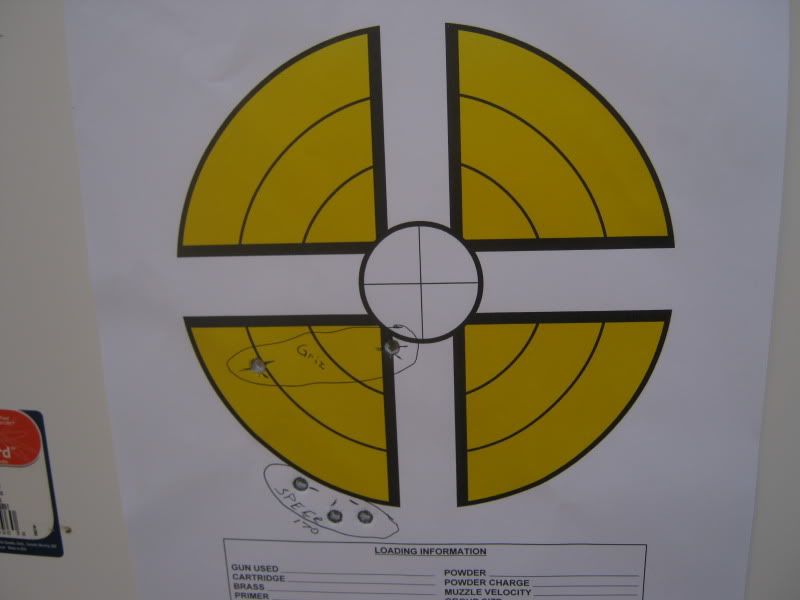
Ricky Helping Chrono -
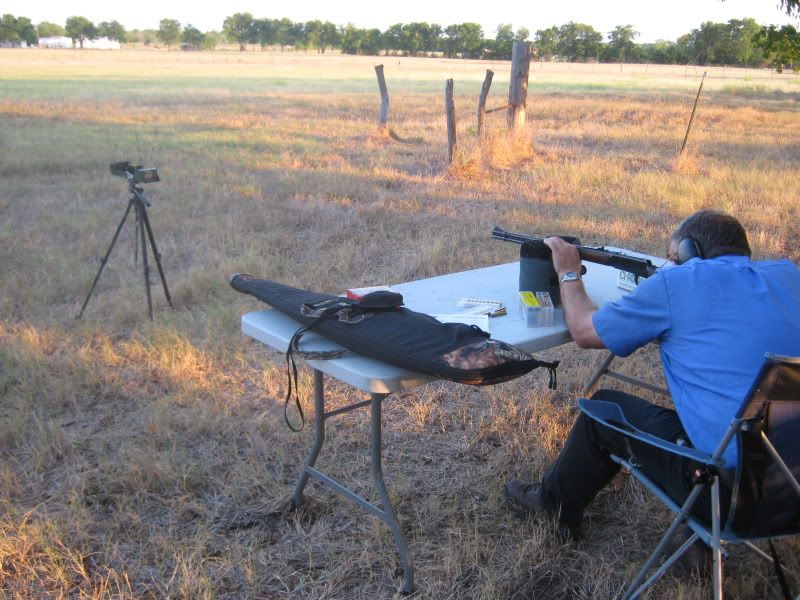
Chrono and accuracy notes -
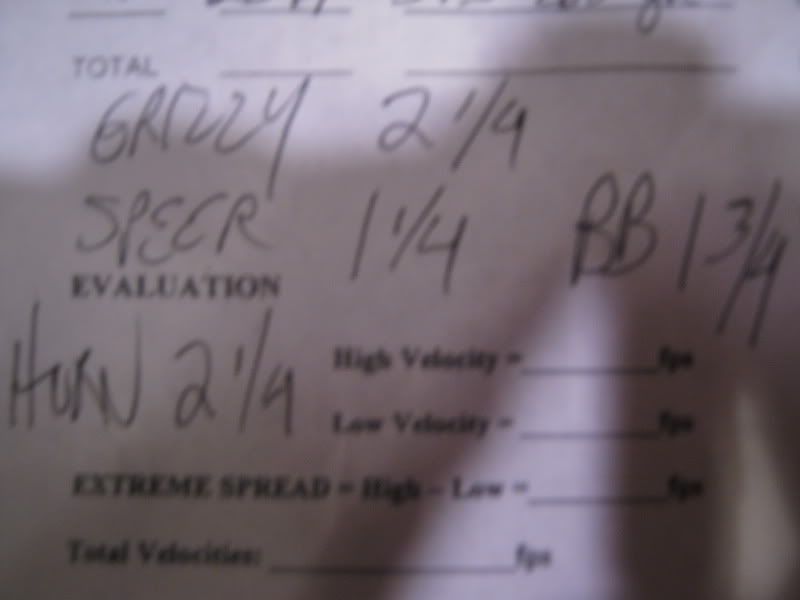

Andy Hill (Hawk Bullets) -(Recited to me from a 3rd party).
The 190 grain made for Tim Sundles features a hard cast lead core, a .035 heavy- non annealed jacket, about 20 grains of exposed lead tip, a .196 meplat and the usual hole in the base of the bullet. I don't expect it to expand. If anything, I think it will lose the 20 grain lead tip and act something like a full metal jacket. If it encountered a lot of resistance I wouldn't be surprised if it broke. I am not sure about it being effective in stopping game or putting game down quickly because of the real potential for a small diameter bullet hole. I did not try these bullet on game but Tim tested them and they are what he ultimately wanted. We did try 195 and 200 grain but they wouldn't stabilize and accuracy was poor.
The 170 grain bullet Mike Rintoul loads has a pure lead core, a .025 annealed soft jacket, about 10 grains of exposed lead tip, a .196 meplat and the hole in the base of the bullet. It is meant to be soft and expand rapidly and easily. It will probably exit on broadside shot on deer but may not if it encounters hard bone. Mike's idea was to run this bullet relatively fast without an increase in pressure and have a large permanent wound channel for game up to 300 pounds.
Chris at ATK/Speer -
The 170 grain FP has been in the line up for years. It is a little different than the bullets that were loaded in Federal ammo and they are a little softer than the "Fusion" bullet used in that product line. It should hold together well and retain 75% or more weight with good penetration and expansion.
Hornady E-Mail response to question "what kind of game are your 30-30 LeverEvolution bullets good for, are they for deer or does it increase the cartridge capabilities for bigger game"?
The new LeverEvolution bullets feature a tip that helps initiate expansion at a wide velocity range. The bullet will expand reliably while penetrating deeply. The components make it possible to maximize velocity and accuracy and in the 30-30 the aero-dynamic bullet are safe for tubular magazines.
Here's the real deal on accuracy and velocity first - all shots fired from a 1952 Winchester Model 94 standard. Accuracy testing was done at a little more than 50 yards with the fore-end resting on a soft support. 3 shot groups. The Speer bullet is over Federal brass, 30.5 gr of H4895 and a CCI 250M primer, Lee factory crimped in crimp groove.
Buffalo Bore - 1.75"
Grizzly Cartridge - 2.25"
Hornady - 2.25"
Speer - 1.25"
VELOCITY - Averaged
Buffalo Bore - 2081.5 fps
Grizzly Cartridge - 2298.5 fps
Hornady LE - 2239.5 fps
Speer - 2134.5 fps
THE AMMO and BULLET-


ACCURACY


Ricky Helping Chrono -

Chrono and accuracy notes -


Testing penetration required some thought on how to mimic the most extreme uses for the ammo as advertised. Buffalo Bore actually mentions defensive use on bears - that's pretty extreme. With that in mind, an interior Grizzly or a coastal Brown Bear is going to weigh 1000 pounds give or take. A defensive shot is likely to be a frontal shot as an animal comes at you. That means a head shot or one that hits somewhere under the chin. At the right angel, that would put the neck area of spine behind the head too. Personally, I'd let a charging animal get close, probably 15 feet or less but I figured most people would feel the intentional forward motion of a threat at 25 yards would be encroaching on their personal space and the trigger pulling would begin. Here's the best representation of that I could come up with - cow weighing near 1000 pounds. The animals were positioned on the belly with the legs tucked in. The chin was positioned on the ground with the head tilted downward and forward. This brought the flat part of the forehead in line with the rest of the body. It also put the neck bone behind the head. Shots were fired from a prone position so they were straight on and would have to go into the whole body. The shots were at 22 yards. The first four, one of each cartridge were aimed right at the flat square of the head. We then cut the head off, peeled back the hide and began cutting 1" thick layers of meat with an electric saw until we saw a wound channel or bullet. The distance from the entry hole was measured and recorded and the wound channel was photographed. First - the PENETRATION.
Hornady 160 gr LE - 12.5"
Grizzly 170 gr - 14.0"
Buffalo Bore 190 gr - 18.25"
Speer 170 gr - 20.25"
"WHAT"? You proclaim. Yes, the Speer load with 2134 fps average MV penetrated a little more than the buffalo bore. All these bullet penetrated the front and back skull and several inches of meat.
I didn't believe it either, so I blew another $150 and set up another cow the same way. This time I fired the Speer first aiming at the inside corner of the left eye. This was followed by the Buffalo Bore aimed at the inside corner of the right eye. Upon examination, each bullet stayed in it's respective half and encountered the same things. The results were consistent with the first try:
Buffalo Bore - 18.5"
Speer - 20"
What about the expansion? Well here it is all measured at the widest point:
Hornady - .542
Grizzly - .807
Buffalo Bore - .495
Buffalo Bore - .650
Speer - .318
Speer - .496
How about the weight?
Hornady - 125.3 gr both pieces combined Total jacket/core seperation
Grizzly - 159.1 gr both pieces combined Total jacket/core seperation
Buffalo Bore - 184.8 gr long shank and good mushroom bent to one side
Buffalo Bore - 180.5 gr long shank and good mushroom bent to one side
Speer - 159.4 gr - short shank and round mushroom
Speer - 164.6 - long shank and very little frontal expansion

GRIZZLY -
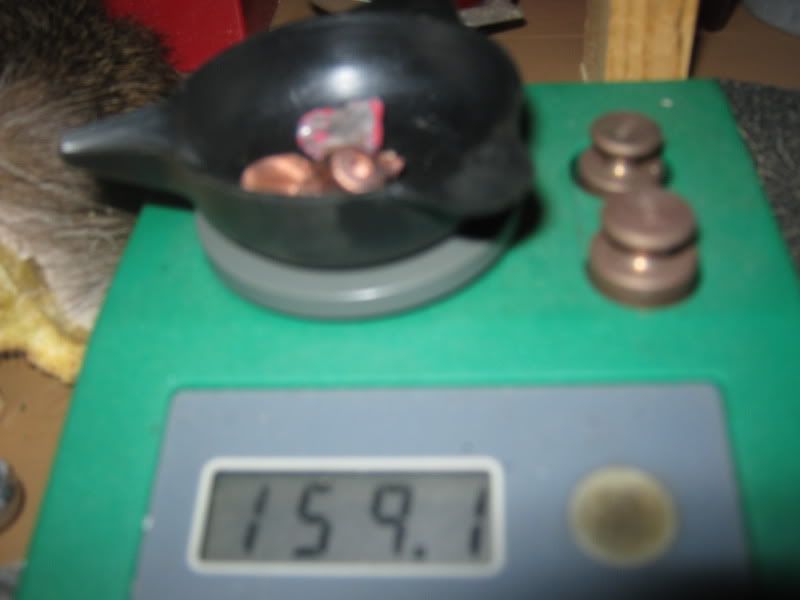
HORNADY -
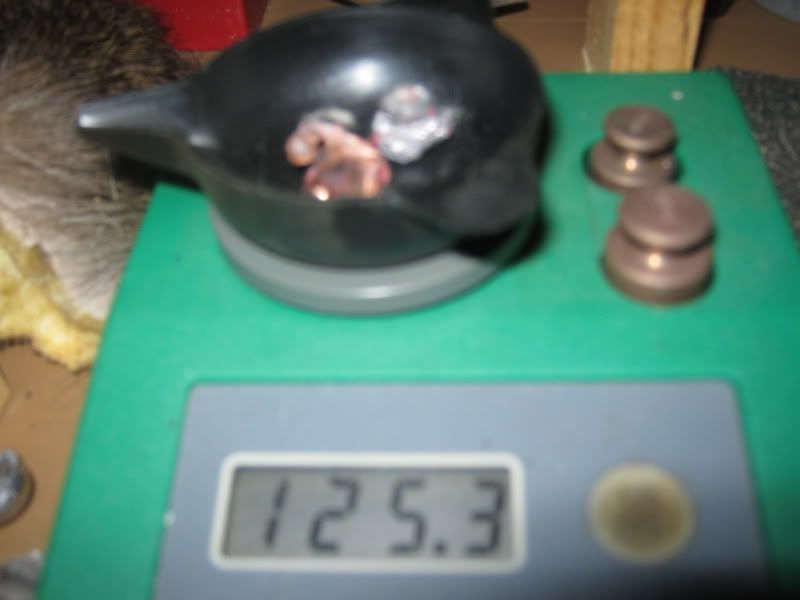
SPEER
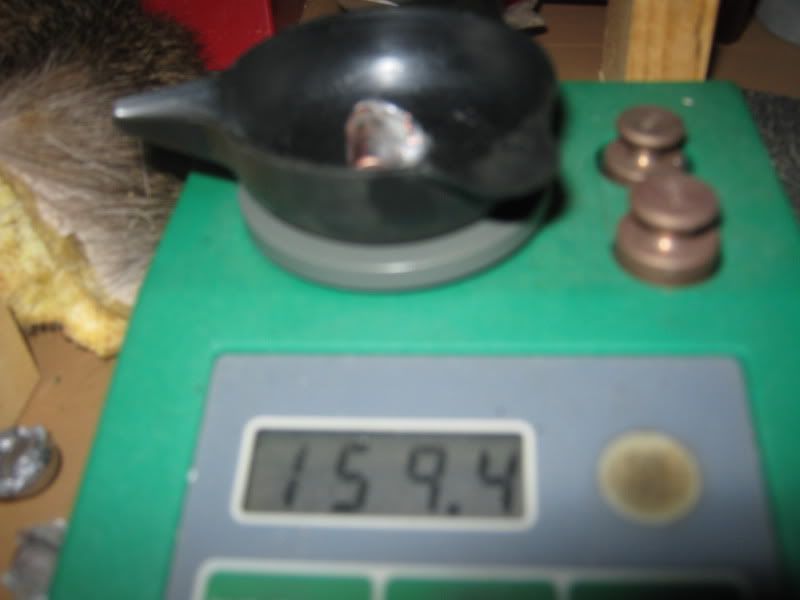
SPEER
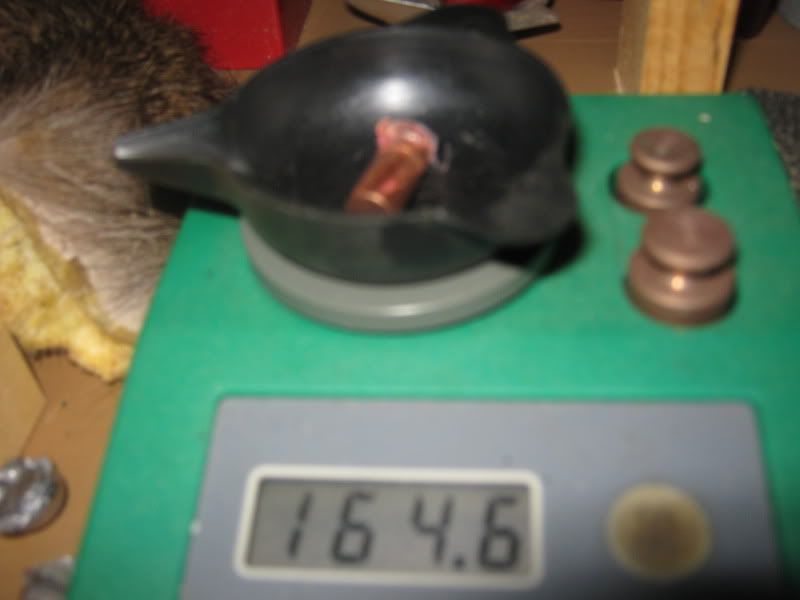
BUFFALO BORE
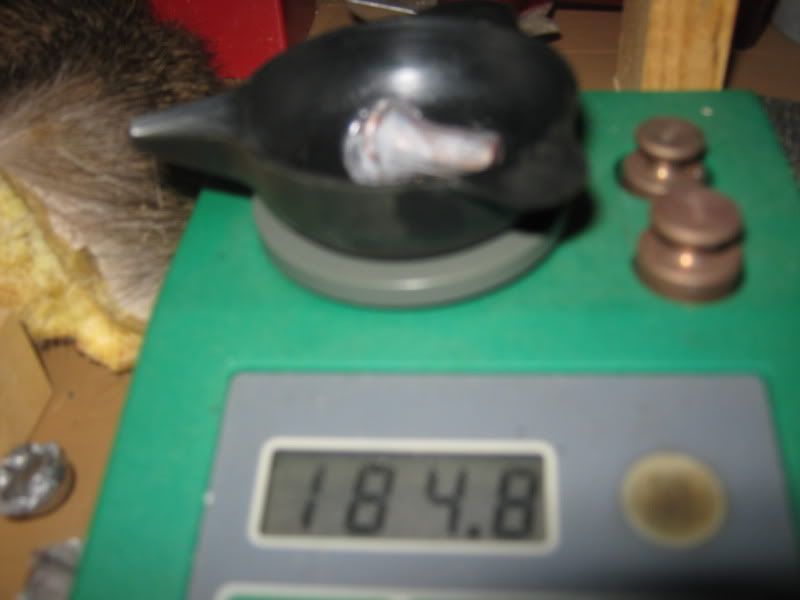
BUFFALO BORE
-Josef A. Riekers-
You wouldn't happen to know to Cartridge Overall Length for the buffalo bore 190? 2.5xx
ReplyDeleteI'd like to know what calipers read on them if you'd be so kind.
Thanks
Joe is unavailable to ask to measure the cartridge and I don't have any (and never have). I do know that the Buffalo Bore ammo is made to work through all standard .30-30 (.30 WCF actions) and does not exceed COL that will do that. I don't believe that a person who has a Marlin, Winchester, Savage 340 or 170, Stevens or Henry .30-30 is going to have any problems with Tim Sundles ammo.
ReplyDelete